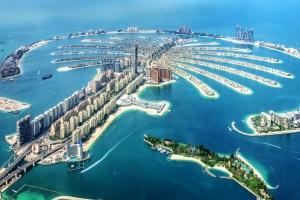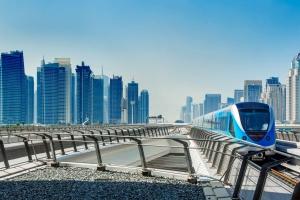AED
9.92 million
$655.79 billion
16th RANKED
Arabic
Monthly
Benefits of hiring in UAE
With Velocity Global's unique expertise and excellent support, we streamline hiring distributed talent in UAE and beyond.
Benefits of hiring in UAE
The UAE offers foreign-owned businesses more than 40 multidisciplinary Free Zones, where foreign investors can fully own their companies. Free Zones have their own regulations and customs, which accommodate specific industries within each zone. Several benefits include:
- 100% ownership without local affiliation
- 100% corporate, income, and customs tax exemption
- Free transfer of funds
- Long-term leasing options at competitive rates
The UAE’s economy is the strongest in the Gulf region. Its infrastructure has a robust road network, major ports in all emirates, and the largest airline in the Arab world.
Emirati banks actively lend to private businesses, offering a substantial variety of financial services compared to their neighbors. The cost of borrowing is low for companies exploring expansion in the Middle East, as the Emirati governments understand the importance of supporting and boosting their non-oil economy.
Among the Arab Gulf countries, the UAE remains to have greater political stability than its regional counterparts. Religious extremism isn’t an issue; the country has resolved border disputes with its neighbors.
The United Arab Emirates’ economy is the strongest in the Gulf region.
Challenges of hiring in UAE
The UAE is well-known for being an oil-rich country. As such, it historically depends upon oil exports as a significant part of its economy, roughly 70% of its total revenues.
The UAE highly depends on foreign labor, whereas about 85% of the population is non-native. Businesses must follow strict guidelines to acquire their employees' work and resident permits. Using an employer of record helps expedite hiring talent in the UAE.
Although the Free Zones provide attractive business environments, government regulations vary widely between all Emirates. Businesses expanding into more than one Free Zone must carefully adhere to each Zone’s rules.
Businesses must follow strict guidelines to acquire their employees' work and resident permits.
Cultural nuances of doing business in UAE
In the UAE, it’s customary to use the standard Arabic salutation, “As-salaam alaikum,” peace be upon you. Then, in response, “Wa alaikum as-salam,” meaning upon you be peace.
When greeting Emirati colleagues, greeting the eldest and senior-level officials first is considered respectful. Handshakes using the right hand are the norm. For greetings between genders, it’s recommended that men should wait for Emirati women to extend their hand first.
Personal relationships are the foundation of business partnerships in the Arab world. Be prepared to have a handful of small talk meetings before beginning negotiations. A fast, high-pressure method is not welcomed. When doing business in the UAE, expect meetings to lack set agendas, as diversions are common and not offensive.
Avoid scheduling meetings during prayer times.
It’s routine for business to be conducted over a meal or beverages. It can be considered impolite to refuse food or drink when offered.
It’s best to return favors of hospitality. When an Emirati colleague hosts a business dinner, extend a similar offer when appropriate.
Honoring the terms of an agreement is highly valued and respected by Emiratis, since they take one’s word very seriously.
Personal relationships are the foundation of business partnerships in the Arab world.

Hiring in United Arab Emirates
-
Employment Agreements in UAE
When applying for a residence visa and work permit, all UAE employees must complete an employment contract provided by the Ministry of Human Resources and Emiratisation. The contract specifies:
- Employee’s personal information
- Beginning date of employment
- Expiry, or renewal, date of employment
- Place and nature of employment
- Salary information
Before signing the employment contract, all employees must sign an offer letter stating the basic employment terms. The basic terms are as follows:
- Names of the employer and employee
- Beginning date of employment
- Expiry, or renewal, date of employment
- Salary information
- Usual working hours and days
- Annual leave and pay
- Sick leave and pay
- National holidays
- Employee’s working title
- Notice period for termination of the employment relationship
- Place of employment
- Employer’s disciplinary rules, if applicable
- Free Zone rules, if applicable
-
Probation periods in UAE
Probation periods in the UAE are permissible. Article 37 of the Emirati Labor Law states that probation periods cannot exceed six months, and employers cannot place employees under probation more than once.
Easily navigate payroll laws, contributions and requirements in UAE
No Due Date
There is no personal income tax in the UAE. There are no individual tax registration or reporting requirements.
Monthly
The payroll cycle in the UAE is usually the first day of the month. If the pay period is not detailed in the employment contract, the employee must be paid at least once a month.
48 HRS/WK
Working hours in the Dubai International Financial Center (DIFC) and the Abu Dhabi Global Market (ADGM) must not exceed, on average, 48 hours over a seven-day working week.
-
Minimum wages and salaries in UAE
There is no national minimum wage in the UAE. The Emirati Labor Law states that all wages and salaries must meet employees’ basic needs. The UAE Cabinet decree determines the minimum wage and cost of living index for specific professions and areas of the country.
-
Bonus payment in UAE
Employers are not legally obligated to reward employees with a contractual or discretionary bonus. However, bonuses are common in the UAE and are at the employer's discretion.
-
Overtime in UAE
In Ajman, Ras Al-Khaimah, Sharjah, Fujairah, and Umm Al-Quwain emirates, overtime is considered time worked over normal business hours. Overtime cannot exceed two hours per day. Overtime pay depends upon when it is performed. The overtime pay calculation is as follows:
- Between 4 a.m. to 10 p.m.: 125% of an employee’s regular wage
- Between 10 p.m to 4 a.m.: 150% of an employee’s regular wage
- On a rest day or public holiday: 150% of an employee’s regular wage or paid time off of work in lieu of compensation
There is no statutory entitlement to overtime in the DIFC.
In the ADGM, employers are required to give overtime compensation for work performed in excess of 832 hours over a four-month period. Employers are able to determine whether overtime compensation is in wages, paid time off in lieu, or a combination of both. Overtime compensation is calculated as 125% or 150% of an employee’s regular wage for overtime between 9 p.m and 4 a.m.
Accurately budget payroll costs for your global team.
Get reliable insights into employee costs and contributions in the UAE so you can confidently expand your global workforce.
Please fill out your contact information and hiring details, and an expert from our team will be in touch with you shortly.
Taxes and social security in UAE
There is no personal income tax in the UAE. In January 2022, the Ministry of Finance announced a federal corporate tax on business profits applicable across all emirates for domestic businesses. Foreign businesses in Free Zones are exempt from all taxes.
Tax thresholds in UAE
The UAE corporate tax will become applicable either on July 1, 2023, or January 1, 2024, depending upon the financial year followed by the business. The tax brackets for domestic businesses are as follows:
- Up to AED375,000: 0%
- Above AED 375,000: 9%
- A different rate, not yet specified, for large multinational companies that meet specific criteria set by the OECD Base Erosion and Profit Shifting Project.
Health insurance in UAE
The UAE healthcare system is comprehensive, government-funded, and regulated at the federal and emirate levels. Healthcare varies in the UAE from emirate to emirate, but overall, medical service quality is high.
The UAE has free public healthcare for Emirati residents. Non-residents pay higher fees for medical treatment. However, the government subsidizes costs, and the standard of care is high at both public and private medical facilities.
Regardless of employment status, all residents of Dubai and Abu Dhabi are required to have health insurance. In the remaining emirates of Ajman, Ras Al-Khaimah, Sharjah, Fujairah, and Umm Al-Quwain, employers do not need to provide health insurance to employees.
Pensions in UAE
The General Pension and Social Security Authority (GPSSA) provides UAE residents with pension-related services. The UAE pension scheme by GPSSA covers old-age retirement, disability, death, and occupational illnesses. According to Article 16 of the UAE Labor Law, employees are entitled to an old-age retirement pension in the UAE if they complete the following requirements:
- 50 years of age
- 20 years of service
The old-age retirement pension amount increases by two percent for every year the employee works after 20 years of service until completing 35 years of service. Employees who complete 35 years of service qualify to receive an old-age retirement pension equal to their salary. Employees who exceed 35 years of service qualify to receive an old-age retirement pension equal to a salary of three months for each year.

Leave entitlements in the United Arab Emirates
-
Annual leave in the UAE
After completing six months of service, employees receive annual leave in the UAE. Employees are permitted the following:
- 2 days per month, if they have worked for six months but not a year
- 30 days if they have worked one year of service
-
Parental leave in the UAE
Maternity leave in the UAE is 90 days with full salary, while paternity leave in the UAE is three days with full salary.
-
Sick leave in the UAE
After completing the probation period, employees receive paid sick leave of 90 days per year. The salary pay is as follows:
- 100% salary for the first 15 days
- 50% salary for the following 30 days
- 0% salary for the remaining 45 days
Employees must notify their employer about the illness within three days by providing a medical report issued by a certified medical entity.
During the probation period, employees are permitted unpaid sick leave by providing a medical report issued by a certified medical entity.
-
Regional and national holidays in the UAE
The UAE has 15 public holidays in a calendar year, which are not included in the minimum paid leave entitlement and are taken in addition to annual leave. The following are national holidays in the UAE:
- Gregorian New Year: January 1
- Eid Al Fitr: From 29 Ramadan to 3 Shawwal* (4 days), the specific days fluctuate each year
- Arafah Day and Eid Al Adha: From 9 to 12 Dhu al Hijjah* (4 days), the specific days fluctuate each year
- Islamic New Year: 1 Muharram – August or July; the specific day fluctuates each year
- Prophet Mohammed’s Birthday: October; the specific day fluctuates each year
- Commemoration Day: December 1
- National Day: December 2 and 3
- *Islamic holidays are determined according to moon sightings.
Employment benefits in the United Arab Emirates
The UAE’s government benefits programs are administered by a couple of its government agency authorities. The Ministry of Human Resources and Emiratisation provides general supervision and administration of labor relations and employment benefits to UAE residents. The Ministry of Health and Prevention provides and administers general healthcare benefits and procedures to UAE residents.
The General Pension and Social Security Authority (GPSSA) provides pension-related services to UAE residents. Government authorities collect contributions from employers and employees to maintain the UAE Social Security scheme, which maintains pensions, survivor benefits, short-term disability, long-term disability, healthcare, and paid leave entitlements.
Termination and notice periods in the United Arab Emirates
According to Article 43 of the UAE Labor Law, the notice period to terminate the employment relationship by both employer and employee is a minimum of 30 days and a maximum of 90 days.
During the probation period in the UAE, employers can terminate the employment relationship with at least 14 days of written notice. If employees terminate the employment relationship during probation, they are required to provide:
- One month of written notice, when they are joining another UAE business
- 14 days of written notice, when they are leaving the country
The notice period for employees who work in the Dubai International Financial Center (DIFC) and the Abu Dhabi Global Market (ADGM) is determined by length of employment.
The minimum notice period legally required to be given from both employer and employee in the DIFC is:
- Seven days of notice for less than three months of service
- 30 days of notice for at least three months but less than five years of service
- 90 days of notice for five years or more of service
The minimum notice period legally required to be given by both employer and employee in the ADGM is:
- Seven days of notice for less than three months of service
- 30 days of notice for at least three months or more of service
Throughout the UAE, the DIFC, and the ADGM, employers and employees can agree to payment instead of notice.
Employers are permitted to immediately dismiss employees without notice or payment instead of notice if employees commit an act of gross misconduct, as defined in the UAE Labor Law.
The UAE Labor law entitles employees to severance pay after completing one year of service. The severance pay is calculated as follows:
- 21 days of wages for each year of service for the first five years of service
- 30 days of wages for each following year of service, after the first five years




